I'm trying to solve a system of odes basically resembling this one but with one more spring and damper ==> http://scipy-cookbook.readthedocs.io/items/CoupledSpringMassSystem.html
I have a slight problem, though, because one of the parameters I want to implement is time dependent. My first attempt is the following one :
import scipy as sci
import numpy as np
import matplotlib.pyplot as plt
def bump(t):
if t <= (0.25 / 6.9):
return (0.075 * (1 - np.cos(np.pi * 8 * 6.9 * t)))
else:
return 0
def membre_droite(w, t, p):
x1,y1,x2,y2,x3,y3 = w
m1,m2,m3,k1,k2,k3,l1,l2,l3,c2,c3 = p
f = [y1,
(-k1 * (x1 - l1 - bump(t)) + k2 * (x2 - x1 - l2) + c2 * (y2 - y1)) / m1,
y2,
(-c2 * (y2 - y1) - k2 * (x2 - x1 - l2) + k3 * (x3 - x2 - l3) + c3 * (y3 - y2)) / m2,
y3,
(-c3 * (y3 - y2) - k3 * (x3 - x2 - l3)) / m3]
return f
# Initial values
x11 = 0.08
y11 = 0
x22 = 0.35
y22 = 0
x33 = 0.6
y33 = 0
# Parameters
m1 = 90
m2 = 4000
m3 = 105
k1 = 250000
k2 = 25000
k3 = 30000
l1 = 0.08
l2 = x22-x11
l3 = x33-x22
c2 = 2500
c3 = 850
# Initial paramaters regrouped + time array
time=np.linspace(0.0, 5, 1001)
w0 = [x11,y11,x22,y22,x33,y33]
p0 = [m1,m2,m3,k1,k2,k3,l1,l2,l3,c2,c3]
x1,y1,x2,y2,x3,y3 = sci.integrate.odeint(membre_droite, w0, time, args=(p0,)).T
plt.plot(time,x1,'b')
plt.plot(time,x2,'g')
plt.plot(time,x3,'r')
plt.plot(time,y2,'yellow')
plt.plot(time,y3,'black')
plt.xlabel('t')
plt.grid(True)
plt.legend((r'$x_1$', r'$x_2$', r'$x_3$', r'$y_2$', r'$y_3$'))
plt.show()
The error I get is :
if t <= (0.25 / 6.9):
ValueError: The truth value of an array with more than one element is ambiguous. Use a.any() or a.all()
I've looked for similar cases and I came across this topic ==> Solving a system of odes (with changing constant!) using scipy.integrate.odeint?
I've then attempted to adapt my code to this format :
import scipy as sci
import numpy as np
import matplotlib.pyplot as plt
def bump(t):
if t <= (0.25 / 6.9):
return (0.075 * (1 - np.cos(np.pi * 8 * 6.9 * t)))
else:
return 0
def membre_droite(w, t, bump):
x1,y1,x2,y2,x3,y3 = w
f = [y1,
(-250000 * (x1 - x11 - bump(t)) + 25000 * (x2 - x1 - x22 + x11) + 2500 * (y2-y1)) / 90,
y2,
(-2500 * (y2 - y1) - 25000 * (x2 - x1 - x22 + x11) + 30000 * (x3 - x2 - x33 + x22) + 850 * (y3 - y2)) / 4000,
y3,
(-850 * (y3 - y2) - 30000 * (x3 - x2 - x33 + x22)) / 105]
return f
# Initial values
x11 = 0.08
y11 = 0
x22 = 0.35
y22 = 0
x33 = 0.6
y33 = 0
# Initial paramaters regrouped + time array
time = np.linspace(0.0, 5, 1001)
w0 = [x11,y11,x22,y22,x33,y33]
x1,y1,x2,y2,x3,y3 = sci.integrate.odeint(membre_droite, w0, time, args=(bump,)).T
plt.plot(time,x1,'b')
plt.plot(time,x2,'g')
plt.plot(time,x3,'r')
plt.plot(time,y2,'yellow')
plt.plot(time,y3,'black')
plt.xlabel('t')
plt.grid(True)
plt.legend((r'$x_1$', r'$x_2$', r'$x_3$', r'$y_2$', r'$y_3$'))
plt.show()
Reading the previous link, it should have worked but I get another error :
(-250000 * (x1 - x11 - bump(t)) + 25000 * (x2 - x1 - x22 + x11) + 2500 * (y2 - y1)) / 90,
TypeError: 'list' object is not callable

